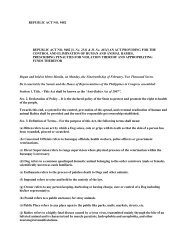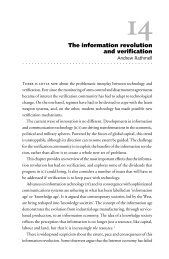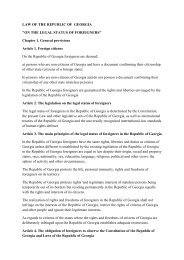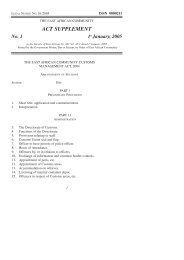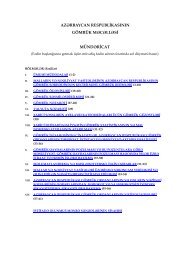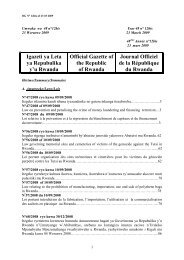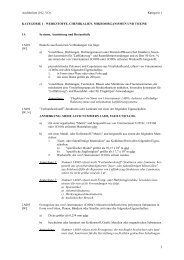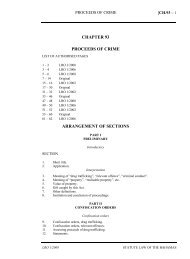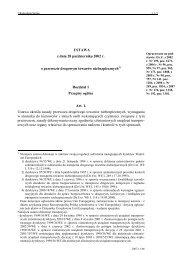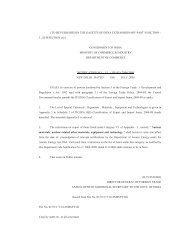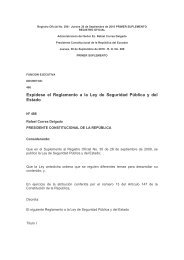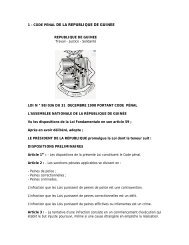DÉCISION 2008/616/JAI DU CONSEIL du 23 juin 2008 ... - EUR-Lex
DÉCISION 2008/616/JAI DU CONSEIL du 23 juin 2008 ... - EUR-Lex
DÉCISION 2008/616/JAI DU CONSEIL du 23 juin 2008 ... - EUR-Lex
Create successful ePaper yourself
Turn your PDF publications into a flip-book with our unique Google optimized e-Paper software.
6.8.<strong>2008</strong> FR Journal officiel de l'Union européenne L 210/67<br />
Les États membres échangent des messages en les envoyant directement au destinataire. Le centre de données d'un<br />
État membre est relié au réseau utilisé pour l'échange de messages (TESTA). Les États membres se connectent au<br />
réseau TESTA via leur passerelle nationale. Un pare-feu est utilisé pour la connexion au réseau, et un routeur relie<br />
l'application Eucaris au pare-feu. Un certificat est délivré soit par le routeur, soit par l'application Eucaris, selon la<br />
solution retenue pour protéger les messages.<br />
Les États membres peuvent utiliser l'application client fournie pour effectuer des recherches dans leur propre<br />
registre ou ceux des autres États membres. L'application client se connecte à Eucaris. Les clients sont identifiés par<br />
nom d'utilisateur et mot de passe, ou par un certificat de client. La connexion avec un utilisateur dans un service<br />
externe (par exemple, la police) peut être cryptée; il revient à chaque État membre de prendre une décision à ce<br />
sujet.<br />
3.1.2. Champ d'application <strong>du</strong> système<br />
Le champ d'application d'Eucaris est limité aux processus liés à l'échange d'informations entre les autorités<br />
chargées de l'immatriculation dans les États membres et à une présentation sommaire des informations en<br />
question. Les procé<strong>du</strong>res et les processus automatisés dans lesquels les informations doivent être utilisées ne<br />
relèvent pas <strong>du</strong> champ d'application <strong>du</strong> système.<br />
Les États membres peuvent choisir soit de recourir à la fonctionnalité <strong>du</strong> client Eucaris, soit de créer leur propre<br />
application client. Le tableau ci-dessous décrit les aspects <strong>du</strong> système Eucaris qui sont d'utilisation obligatoire ou<br />
recommandée et lesquels sont facultatifs et/ou de détermination libre par les États membres.<br />
EUCARIS aspects M/O ( 1 ) Remark<br />
Network concept M The concept is an «any-to-any» communication.<br />
Physical network M TESTA<br />
Core application M The core application of EUCARIS has to be used to connect to the<br />
other Member States. The following functionality is offered by the<br />
core:<br />
— Encrypting and signing of the messages;<br />
— Checking of the identity of the sender;<br />
— Authorization of Member States and local users;<br />
— Routing of messages;<br />
— Queuing of asynchronous messages if the recipient service is<br />
temporally unavailable;<br />
— Multiple country inquiry functionality;<br />
— Logging of the exchange of messages;<br />
— Storage of incoming messages<br />
Client application O In addition to the core application the EUCARIS II client<br />
application can be used by a Member State. When applicable, the<br />
core and client application are modified under auspices of the<br />
EUCARIS organisation.<br />
Security concept M The concept is based on XML-signing by means of client<br />
certificates and SSL-encryption by means of service certificates.<br />
Message specifications M Every Member State has to comply with the message specifications<br />
as set by the EUCARIS organisation and this Council Decision. The<br />
specifications can only be changed by the EUCARIS organisation<br />
in consultation with the Member States.<br />
Operation and Support M The acceptance of new Member States or a new functionality is<br />
under auspices of the EUCARIS organisation. Monitoring and help<br />
desk functions are managed centrally by an appointed Member<br />
State.<br />
( 1 ) M = (mandatory) utilisation ou respect obligatoire; O = (optional) utilisation ou respect facultatif.



